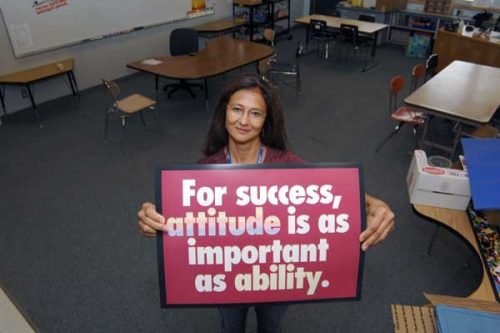 Linda Shelley, CISP coordinator at Vaughn Elementary School, is proud to be helping local students thrive at school. Photo by Scott Turner, KP News
Linda Shelley, CISP coordinator at Vaughn Elementary School, is proud to be helping local students thrive at school. Photo by Scott Turner, KP News
Communities in Schools-Peninsula, better known as CISP, is part of a nationwide organization that’s rated as the No.1 dropout prevention organization in the United States.
They do it by working one-on-one with kids who need extra help with reading and math.
On the Key Peninsula, CISP offers reading programs at Vaughn, Minter and Evergreen elementary schools, and math programs at Key Peninsula Middle School and Purdy Elementary, according to Key Peninsula resident Colleen Speer, who has been CISP executive director for 10 years.
In addition to academic tutoring, CISP also presents assemblies about drug and bully prevention, provides school supplies to kids who need them and books for students who don’t have home libraries. CISP also sponsors a Smile Mobile for kids who don’t have access to dental services.
“And it’s all free for the kids,” Speer said. “We basically partner with the schools. We work hand-in-hand with whatever the school district is doing and fill in the gaps. We’re here to make sure that kids succeed in school and that they graduate on time.”
Most people don’t realize that if kids can’t read by the third grade, their chances of graduating plummet, she said.
“They’ve already made that mental shift that they’re probably not going to graduate. They might not even make it out of middle school,” Speer added.
Speer estimated that in 2012, CISP served more than 4,000 kids with its programs and services.
CISP employs a team of paid program coordinators, who work in the schools writing individualized lesson plans for each student they serve. The coordinators, in turn, oversee teams of carefully screened volunteers who work directly with the students.
Last year, Key Peninsula resident Linda Shelley, the CISP coordinator at Vaughn Elementary, won a national “Unsung Hero” award for her work.
“Linda cares about each kid no matter what issues they’re facing. She also cares about their family life and all those kinds of issues,” Speer said.
Shelley also has developed a program that brings in high school kids to work with students requiring help.
She has been working with CISP for 10 years. “Because I’m a certified teacher, I do ‘pullout programs’ where I take kids who are struggling in math and reading,” she said.
Shelly works with students on behavior and tries to motivate them, as well as working on their specific skills.
By the time they’re in third grade, kids know if they’re going to do well in school, she said.
“You can see that because they’re not connected to school or to their peers or their teachers.
“They have an attitude thing or they’re bullied or they don’t fit in. We try to work with them on their behavior and we try to get them connected to a teacher and to their peers. I’ve seen kids who were pretty isolated go to making friends,” she said.
Shelley even does art with the kids four days a week during the lunch break, and she feeds them when they come into her classes. “These are growing 8-, 9- and 10-year-olds and they’re hungry. So we feed them. A big part of my budget goes for food for these kids.”
She said that many of the kids feel isolated and have low self-esteem. “Kids need an adult they can connect with, that they can feel safe with,” Shelley said.
That’s where the CISP volunteers come in.
According to Shelley, volunteers work one-on-one with the students on a regular, consistent basis to help them with their reading and math skills. Many are grandparents; some are high school students who enjoy helping others.
“The consistency is a really important thing,” Shelley said. “There are kids who’ve seemed sullen and withdrawn and they’ve just blossomed and become beautiful, productive people.”
Susan O’Leary, principal at Vaughn Elementary, doesn’t know what she’d do without the CISP program.
“It makes a huge difference in our students’ education.” O’Leary said. “Without that sort of basic-needs support, kids aren’t prepared for learning. Sometimes it’s food, clothes, counseling. All those basic needs have to be met before kids are ready to learn.”
O’Leary said that Shelley and her volunteers help students get to a place “where they can meet standards, and the kids do grow and achieve because of CISP. “If CISP were to walk away today, we’d feel a huge hole left,” she said.
For information, visit peninsula.cisp.org or call 884-5733.
UNDERWRITTEN BY THE FUND FOR NONPROFIT NEWS (NEWSMATCH) AT THE MIAMI FOUNDATION, THE ANGEL GUILD, ADVERTISERS, DONORS AND PEOPLE WHO SUPPORT INDEPENDENT, NONPROFIT LOCAL NEWS